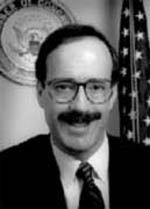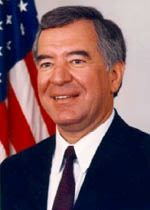 |
| Vol. 3 No. 4 | Table of Contents MEIB Main Page | April 2001 |
 |
| Rep. Eliot Engel |
"I am very disgusted that it has not left Lebanon, as Israel has, and is continuing to violate the Ta'if Accord and Resolution 425 in the UN," said Rep. Eliot Engel (D-New York). Rep. Gary Ackerman (D-New York) told Walker that he hopes "that the administration is making clear to Syria that the United States supports the full implementation of the Ta'if Accords, in particular with respect to Syria's withdrawal from Lebanon." Rep. Tom Lantos (D-California) added: "I would like to know what steps we are taking and what steps we are encouraging our European friends to take to see to it that Syria lives up to its contractual obligation."
In response, Walker told the congressmen that "peace will be the best answer to achieve a withdrawal of all Syrian forces from Lebanon." He later reiterated that the Bush administration's "ultimate aim is to have peace treaties between Syria and Israel, and Lebanon and Israel which would solve this problem.
In an apparent effort to ameliorate the hostile line of questioning, Walker declared that the Syrians "have removed some forces and lowered the presence of Syrian troops in Lebanon," but this claim was directly challenged by Rep. Darrell E. Issa (R-California), who said he was unaware of any "significant movement by Syria" to redeploy its forces from any area of the country. "Yeah. It's not that they've actually withdrawn from any particular area," Walker admitted, then added carefully that the Syrians have limited the presence of "armed and uniformed individuals" in Beirut (an implicit acknowledgement that the large number of plainclothes Syrian intelligence officers in the capital has not been reduced).
Walker also stated that the US would like to see Syria "reduce" its influence in Lebanon and undertake a limited redeployment of its forces as specified in the 1989 Ta'if Accord, but made it clear that there would be no pressure on Damascus in the absence of a peace settlement. "In the meantime," he said, "we have to continue to work with the Syrian authorities . . . to try to reduce the influence they have." He added that the US administration has also "encouraged the Lebanese authorities to work with the Syrian authorities."
Walker's comments echoed the evasive remarks made by Secretary of State Colin Powell during his March 7 testimony before the House International Relations Committee. Questioned by Engel about what steps the Bush administration is taking to bring about a Syrian withdrawal from Lebanon, he said that it would be beneficial if Syrian military forces left Lebanon "eventually at some point." Powell added that a Syrian withdrawal "isn't going to happen tomorrow."
Rahall Dissents
 |
| Rep. Nick J. Rahall |
Ironically, Rahall is of Lebanese descent. However, Lebanese Americans have long complained that the congressman has been manipulated for public relations purposes by representatives of Syria's satellite regime in Lebanon. "Unfortunately, representing the interests of Lebanese Americans doesn't get you invited as guest of honor to social functions at the Lebanese embassy in Washington," said United States Committee for a Free Lebanon (USCFL) President Ziad K. Abdelnour in reaction to Rahall's comments. "And it certainly doesn't produce invitations to one-on-one meetings with Gen. Lahoud at the presidential palace in Beirut."
Notes
1 The Daily Star (Beirut), 13 April 2001.
Related Articles
"US Mideast Policy and the Syrian Occupation of Lebanon," Middle East Intelligence Bulletin, March 2001.